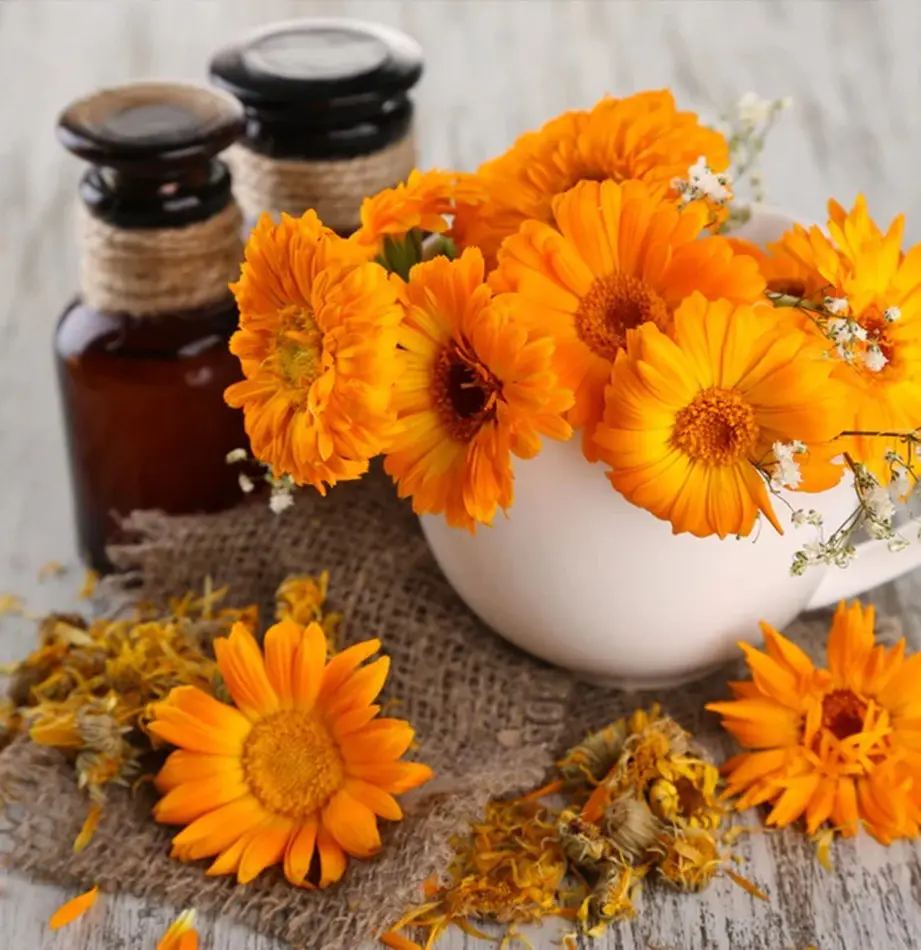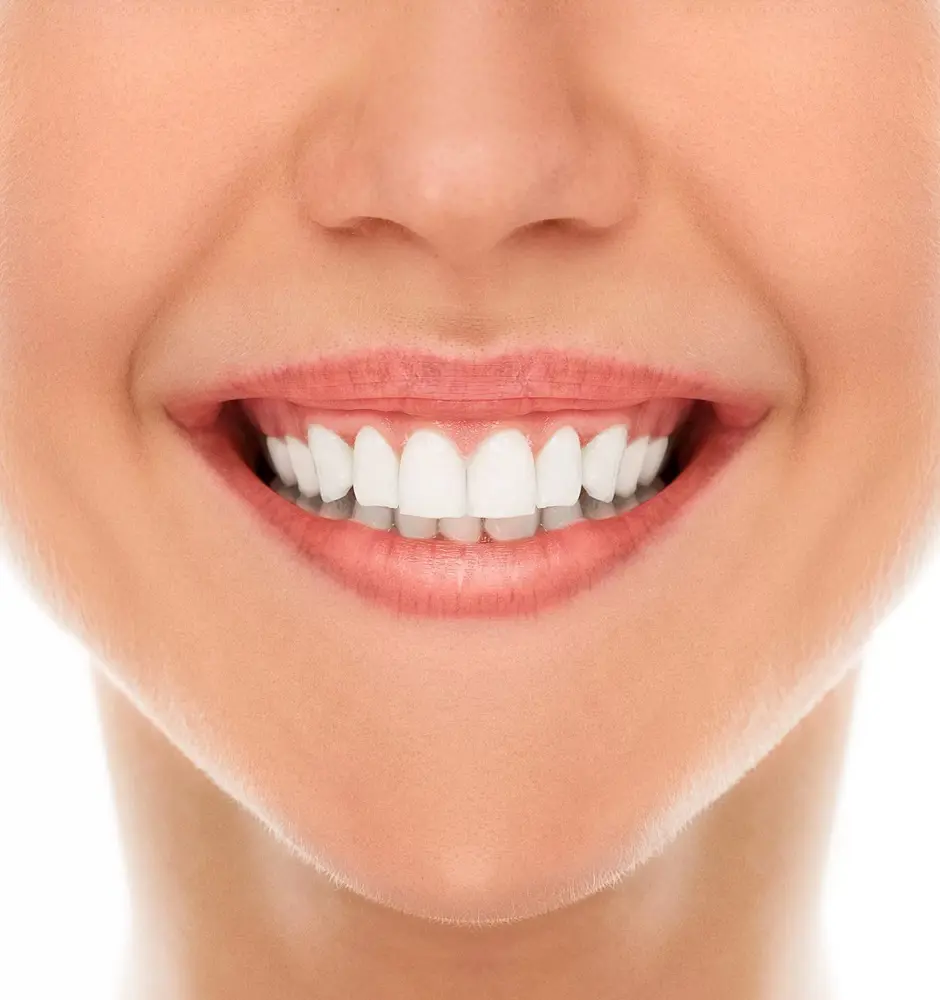10 Calendula Health Benefits and Possible Side Effects

This post may contain affiliate links. If you make a purchase through links on our site, we may earn a commission.
Commonly used in medicinal preparations in several medicine systems, calendula is an annual herb in the daisy family (Asteraceae) originating from southern Europe and the Eastern Mediterranean area. It is suitable for borders, beds cut flower gardens, and containers.
Also known as English Garden Marigold, dried flower petals of calendula have been traditionally used to treat inflammations, promote wound healing, and for many other skin conditions. Here, you will be able to find out the health benefits and possible side effects associated with calendula.
1. Rich In Antioxidants
Calendula is a powerful herb that has been used for medicinal purposes for many centuries. It consists of several potent antioxidant compounds collectively contributing to calendula's protective effects against various health issues. Here are some of the major compounds:
- Flavonoids: These plant-based compounds having strong antioxidant properties help protect cells from damage and oxidative stress by neutralizing free radicals.
- Carotenoids: These compounds are primarily responsible for the protection of your skin, eyes, and other tissues from damage caused by free radicals.
- Polyphenols: These compounds reduce the oxidative stress in the body, thereby helping to combat inflammation and protect against chronic diseases.
- Triterpenoids: These compounds possess both antioxidant and anti-inflammatory properties helping to reduce inflammation and protect cells from damage.
2. Heals Skin Ulcers And Wounds

In studies done for slow-healing wounds and various exposed ulcers, it was found that using calendula extract helped speed up recovery rate and healing. Calendula helps improve skin firmness and hydration. As well as, it helps increase blood flow and oxygen to wounds and infected areas, which helps the body grow new tissue and heal more rapidly.
One test-tube study determined that calendula extract increased the amount of collagen in wounds as they healed. This protein is necessary to form new skin. Similarly, in a 30-week study of 41 adults with diabetes-related foot ulcers, 78% of participants achieved complete wound closure after daily treatment with calendula spray.
3. Combats Certain Cancer Cells
Calendula’s antioxidant content may provide anti-tumor effects. Calendula can help fight against cancer and irritation due to its anti-inflammatory properties. Research indicates that the extract activates proteins that kill cancer cells while simultaneously blocking other proteins that would otherwise interfere with cell death.
Research also found that calendula appears more effective than typically recommended topical agents at reducing and preventing the incidence of dermatitis caused by radiation used for breast cancer treatment. Extracts from related calendula species have also been shown to exert activity against human cancer cell lines.
A 2018 study showed promising results for calendula regarding its potential benefits in cancer management.
4. Possesses Antimicrobial Properties
Calendula can prove to be effective against a range of fungal infections, including those caused by Candida species. The acids held within the oils of this plant have powerful antimicrobial and antiviral effects, especially when fortified with sunflower oil. The oils and acids within the plant are effective in fighting pathogens, as well as candida symptoms and even antibiotic-resistant strains of bacteria.
You can make topical application of calendula to prevent and treat bacterial infections in wounds, cuts, and abrasions.
5. Improves Oral Health

Calendula has been considered a popular additive in toothpaste and mouthwash over the past few years. It helps reduce gum inflammation and promote healing. The astringent properties of calendula help fight mouth bacteria and promote a healthy oral environment.
In Ayurvedic practice, calendula is used for oil pulling in much the same way that you would with coconut oil. The antiseptic properties work to prevent gingivitis and plaque buildup. Studies suggest calendula can help repair the soft tissue of the gums whilst actively fighting plaque.
In a 6-month study of 240 people with gingivitis, those given a calendula mouthwash experienced a 46% reduction in their inflammation levels, compared with 35% in the control group.
6. Enhances Skin Health
Calendula extract is widely used in cosmetics, including creams and ointments, and is usually marketed as a treatment for eczema and dermatitis. The calendula extract possesses the ability to reduce irritations, particularly for those with sensitive skin. As well as it can also reduce both the visible symptoms and feelings of skin irritation and discomfort.
Moreover, this plant helps protect the skin from oxidative stress by neutralizing free radicals. Calendula also has some sun-protecting properties. One 2019 study determined that when it's in cream form, calendula has a sun protection factor (SPF) of 8.36.
Calendula seeds typically include a high concentration of linoleic and calendic acid which help promote a more hydrated, healthy skin moisture barrier.
7. Supports Digestive Health

Calendula has a protective effect on the stomach that improves digestion by repairing the gut wall while relieving discomfort.
Traditionally, calendula flowers have been used for improving digestion and soothing the digestive tract. Calendula contains polysaccharides and other chemicals that support balanced immune system function in the gut. This helps the body to resist infections or overgrowth of an unruly resident gut microbe, while also lowering abnormal immune system responses such as chronic inflammation.
Calendula is one of the herbs that may support gut barrier function to counter leaky gut. It also supports tissue healing which is relevant to issues like ulcerations and other damage to the gut lining.
8. An Immune System Support
Calendula consists of several active substances that may help support the immune system. The antimicrobial properties of calendula slow or kill infections and prevent them from spreading and its antibacterial properties can help you get rid of lingering coughs or congestion.
Similarly, its antioxidants are known for their ability to protect cells from damage caused by free radicals. Calendula has simply been shown to help activate the body’s cells to shovel in foreign debris or invaders. It may help activate other defense mechanisms, subtly.
Consumption of calendula can help protect immune cells from damage maintaining their efficiency in fighting infections. Calendula promotes wound healing and strengthens the skin barrier, reducing the risk of infections that could compromise the immune system.
9. Promotes Eye Health

Calendula extract offers significant benefits for overall eye health. This herb has been traditionally used to treat various eye conditions.
Calendula extract having strong anti-inflammatory effects can alleviate conditions like conjunctivitis and other eye inflammations. It inhibits nitric oxide production, a pro-inflammatory mediator, thereby reducing inflammation in ocular tissues. Moreover, it protects the eyes from free radicals associated with UV rays on the eye retina.
Calendula is rich in beta-carotene which can bring back poor vision and prevent macular disease from occurring. It also fights against cataracts, keeping your vision safe and healthy as a result.
10. Other Benefits
It is believed that calendula does have some other health benefits. Some of them are discussed below:
Regulates The Menstrual Cycle: Calendula is a popular skin and lymphatic herb connected with the menstrual system. It increases blood flow to the pelvic region and helps to bring on a period. Its anti-inflammatory and antispasmodic properties relieve period pain and soothe inflamed tissues. It is also credited with alleviating headaches and nausea, typical symptoms of the pre-menstrual phase. Incorporating this spring herb into your menstrual care routine can make a difference in how you experience your cycle.
Relieves Sore Nipple During Nursing: Calendula is a natural antiseptic, antimicrobial, anti-inflammatory, and an ideal ingredient for soothing damaged or inflamed skin. Topical application of calendula products has been used to treat sore and cracked nipples during nursing, either in homeopathic or pharmacologic preparations.
Boosts Heart Health: Calendula's antioxidants help protect the heart by neutralizing free radicals and preventing oxidative damage to the blood vessels and its anti-inflammatory properties may help reduce inflammation in the cardiovascular system. Moreover, it can also help minimize cholesterol and triglyceride levels in the blood helping to maintain healthy blood lipid levels. It improves the function of the endothelium (inner lining of blood vessels) promoting better blood flow.
Relieves muscle fatigue: Applying calendula topically or using calendula-infused products like oils or creams may help soothe muscle pain, contributing to overall muscle relaxation and relief from fatigue. Calendula helps to reduce muscle spasms by inhibiting spontaneous contractions and therefore causing relaxation of the muscle.
Improves Mood And Mental Well-Being: Calendula may help balance hormones, which can be particularly beneficial for mood swings related to hormonal fluctuations. Also, its positive impact on the production and function of neurotransmitters such as serotonin and dopamine plays a crucial role in mood regulation mitigating symptoms of anxiety and depression.
Supports Joint Health: Calendula's anti-inflammatory properties can help eradicate joint pain and stiffness, making it potentially beneficial for people with arthritis or other inflammatory joint conditions. Its antioxidants aid in protecting joint cartilage from oxidative damage and its relaxing or soothing properties help relax the muscles around the joints reducing tension caused by muscle tightness or spasms.
Improves Respiratory Health: Calendula helps reduce symptoms of respiratory allergies such as hay fever, by lessening the body's allergic response to environmental triggers. Its antioxidants protect the respiratory tissues from oxidative stress and free radical damage. Along with that, the calendula helps to loosen and expel mucus from the lungs relieving congestion and making it easier to breathe in cases of respiratory infections.
Supports Liver Health: Calendula can help support liver function and protect the liver from oxidative stress or toxins with its hepatoprotective properties.

Possible Side Effects
Calendula is generally considered to be safe and healthy for most people. However, it has some possible side effects that you need to be aware of:
Allergic Reactions: People with allergies to other plants from the Asteraceae family such as marigolds, daisies, ragweed, etc. may be more vulnerable to a calendula allergy. The symptoms might include skin rashes, itching, and swelling. If you have allergies, make sure to check with your healthcare provider before taking calendula.
Irritations In Skin: Topical application of calendula can cause skin irritation or dermatitis, especially in people with sensitive skin or existing skin conditions.
Drug Interactions: Calendula may interact with certain types of medications including sedatives, antihypertensive and antidiabetic drugs. Calendula has mild sedative properties. So, the consumption of calendula could further enhance the effects of sedative medications, which can cause excessive sleepiness and slowed breathing.
Likewise, calendula when combined with blood pressure medications might cause a condition associated with low pressure, hypotension. Moreover, a combination of calendula with diabetes medications might cause hypoglycemia, a sudden decrease in the blood sugar level.
Gastrointestinal Problems: The fact that calendula leads to gastrointestinal problems is very uncommon. However, in rare cases, taking calendula can cause gastrointestinal discomfort, including nausea, vomiting and diarrhea.
Pregnancy And Breastfeeding Concerns: Consumption of calendula by mouth during pregnancy is considered to be likely unsafe. There is a concern that it might cause a miscarriage. So, it would be best to avoid calendula products while pregnant to remain on the safer side. Since there is not enough information to know if calendula is safe to use when breastfeeding, we recommend you avoid its use.
Hormonal Effects: Calendula may interfere with hormone-sensitive conditions like breast cancer, ovarian cancer, uterine cancer, etc. due to its mild estrogenic effects.
Surgical Considerations: The potential sedative effects of calendula may also create disturbances with anesthesia or surgery. So, you should discontinue its use at least a couple of weeks before any surgery.
Delay In Wound Healing: There is very little chance that calendula might cause a delay in wound healing in some individuals due to an allergic reaction or skin sensitivity. So, you need to monitor the skin's response when making use of calendula on wounds.
Other effects: This herb can lead to serious eye symptoms like blurred vision, tunnel vision, eye pain or swelling. Also, you might experience severe headaches, weakness, loss of coordination, slurred speech, fast or uneven heartbeats and fluttering in your chest.
Recent posts
Nutrition
Nutrition
Liquorice Root: Benefits And Uses
You can spell it liquorice or licorice; this herb or root has been in use for centuries in most medicinal applications, as a natural sweetener and to enhance flavors. Regarding its origins, it comes from the root of the "Glycyrrhiza galbre" plant and...
Nutrition
Is Ramen Healthy? Here's What Dietician Says
Ramen is a traditional dish from Japan that in the recent era has become a global phenomenon. This beloved and comforting soupy dish however has been questioned, when it comes to its nutrition. Best for those looking for a quick (instant), affo...
Nutrition
Is Wheat Bread Healthy? An Expert Picks
Wheat bread has been proudly celebrated as a dietary staple in countless homes for as long as people can remember. It has earned a reputation as a healthier alternative to white or any other processed bread, that no one can deny. Because of its evide...
Nutrition
Is Sausages Healthy? Nutrition And Health Benefits
Sausages are tasty in an addictive way, making them one of the most popular foods worldwide. You may have enjoyed this convenient food often, whether on a bun with mustard or grilled on a barbecue, the simple preparation methods are what makes its co...
Nutrition
Ice Cream Benefits: Nutrition, Potential Risks And Best Choices
Not gonna lie, ice cream is often taken as a guilty pleasure treat, a delightful treat that takes you to cloud nine but is frequently associated with negative health implications. Nonetheless, the happy news is when devoured mindfully, ice cream can ...
Nutrition
Is Sushi Healthy? Some Good and Bad Choices
Sushi is a wholesome meal and a beloved Japanese dish. The traditional sushi recipe is a simple combination of fresh fish, vegetables, and vinegared rice which is popular for its minimalistic preparation. As with any food, there are factors that dete...







